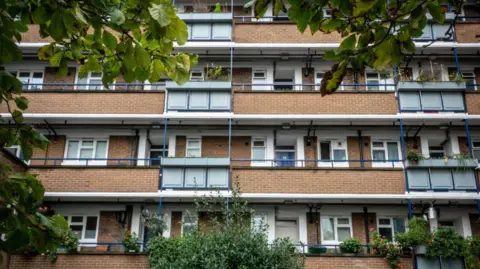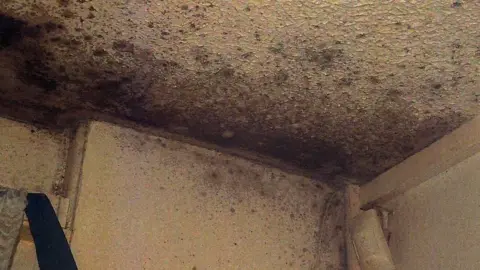Social housing complaints soar as watchdog warns of 'simmering anger'
 Getty Images
Getty ImagesComplaints about substandard living conditions in social housing in England are more than five times higher than five years ago, according to the housing watchdog.
Housing Ombudsman Richard Blakeway said there was an "imbalance of power" in the tenant-landlord relationship and poor housing conditions risks "simmering anger" turning into "social disquiet".
He warned without change, England risked the "managed decline" of social housing.
Asbestos, electrical and fire safety issues, pest control and leaks, damp and mould are among the complaints, the watchdog receives.
In its latest report, the Housing Ombudsman, which deals with disputes between residents and social housing landlords in England, said that the general condition of social housing - combined with the length of time it takes for repairs to be done - is leading to a breakdown in trust.
"You've got ageing homes and social housing, you've got rising costs around materials, for example, and you've got skills shortages," said Mr Blakeway, who spoke to the BBC Radio 4's Today programme.
"You put all that together and you end up with a perfect storm and that's what's presenting in our case work. That is not sustainable."
He said tenants have "little say in the services they receive, however poor they are" and that this is leading to "growing frustration".
While he acknowledged that social landlords are putting in "record amounts" for repairs and maintenance - £9bn between 2023 and 2024 - there had been historic underfunding in social housing.
He also said that while landlords have faced "funding uncertainties", they needed to address their communication with tenants that sometimes "lacks dignity and respect".
The Local Government Association (LGA), a national body that speaks for councils in England, said the social housing situation is becoming "increasingly unsustainable".
The body's spokesperson, councillor Adam Hug said: "Many councils face an impossible choice between running HRAs into deficit or failing to meet statutory repair obligations, including new requirements under Awaab's Law."
He added that the government needed to restore the more than £600 million in lost revenue due to the rent cap in 2024/25 and provide a long-term rent settlement that supports financial stability for HRAs.

According to the ombudsman's report, there were 6,380 complaints investigated in the year to March 2025 - up from 1,111 in the year to March 2020.
Mr Blakeway said repairs were the "single biggest driver of complaints", with the report showing repairs and maintenance made up just under half (45%) of complaints investigated in the year to March 2025.
Referring to English Housing Survey estimates, it also found that an estimated 1.5 million children in England lived in a non-decent home in 2023, and 19% of those live in social housing.
The Housing Ombudsman is calling for a "transformative overhaul" of the current system, including an independent review of funding practices and the establishment of a "national tenant body" to "strengthen tenant voice and landlord accountability".
That would be separate to the ombudsman, which has the power to order a landlord to apologise, carry out works or pay financial compensation.
"The human cost of poor living conditions is evident, with long-term impacts on community cohesion, educational attainment, public health, and economic productivity," said Mr Blakeway.
"Without change we effectively risk the managed decline of one of the largest provisions of social housing in Europe, especially in areas of lowest affordability.
"It also risks the simmering anger at poor housing conditions becoming social disquiet."
This is "neither fanciful nor alarmist", he said, adding that tenant activism formed its roots decades ago in the 1960s, and referencing the ongoing "shock" over the Grenfell Tower fire and the death of two-year-old Awaab Ishak in recent years.
The 2017 tower block blaze which killed 72 people, and the death of Awaab in 2020, caused by prolonged exposure to mould in his home, have put the spotlight on housing standards and safety.
 Rochdale Coroner's Office
Rochdale Coroner's OfficeThe ombudsman report said its team had seen a child's bedroom windows boarded up for four years instead of being replaced.
And it was aware of collapsed ceilings containing asbestos left unrepaired for two years, with a mother and her children forced to tape bin bags over the holes.
The report also highlighted case studies in which disagreements had arisen between tenants and landlords.
In one, a woman living with autism and serious mobility issues - which she had previously informed her landlord of - reported an issue with her toilet that was causing mould and damp.
She reported being upset with how the repairs had been handled, including receiving a call from someone at 02:15, and that this had impacted her autism.
The landlord told the ombudsman they were not aware of the woman's disabilities.
Housing campaigner Kwajo Tweneboa told the BBC that he was "shocked but not surprised" by the ombudsman's report.
He pointed out that for complaints to reach the ombudsman, tenants will have had to formally raise the issue with the landlord.
Mr Tweneboa said social housing residents he has spoken to say they feel they are not listened to and that the culture within housing organisations "just isn't right".
"They feel they are just a rental figure at the end of each month."
"In some cases, residents are left to suffer for years," Mr Tweneboa says, adding that he knows of instances in which families with children have to "defecate in bin bags, urinate in bottles because they've been without a toilet for months".
The National Housing Federation, which represents England's housing associations, said quality and safety of homes was their "top priority", and the sector was spending record sums on repairs and maintenance.
Chief executive Kate Henderson said: "Crippling cuts to social housing over many years have exacerbated quality issues, as the ombudsman recognises, and only an increase in funding can address this over the long-term."
Overcrowding is a "significant contributor" to issues such as damp and mould, she added.
Asked about the ombudsman's report while speaking at a business on Thursday, Prime Minister Sir Keir Starmer said "everybody has the right to a safe place to live" - a stance he says is "absolutely central" to his government's work on housing.
In a statement, a Ministry of Housing spokesperson said: "Everyone deserves to live in a safe, secure home and despite the situation we have inherited, we are taking decisive action to make this a reality."
"We will clamp down on damp, mould and other hazards in social homes by bringing in Awaab's Law for the social rented sector from October, while we will also introduce a competence and conduct standard for the social rented sector to ensure staff have the right skills, knowledge and experience to do their jobs effectively."

Sign up for our Politics Essential newsletter to keep up with the inner workings of Westminster and beyond.
